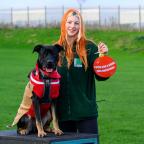
PDSA weekly Q&As - 6 August
Dear PDSA Vet,
I heard that there's a dangerous algae that grows in water in summer that can harm dogs. Is this true, and how can I keep my dog Jerry safe? Allan
Dear Allan, there is a type of bacteria known as blue-green algae that can be very harmful to dogs (and people). It grows quickly in hot weather, particularly in still or slow flowing water such as ponds, streams and lakes, so the recent heatwaves may well have caused it to grow. It usually appears as a green-blue scum or streaks in the water. It produces toxins and sadly is often fatal. Be vigilant and always check water before letting your dog drink or swim in it. It's impossible to tell just from looking if an algae bloom is toxic, so it's best to be cautious and not take any risks. If you think your dog may have come into contact with blue-green algae, call your vet immediately. For more information visit www.pdsa.org.uk/AlgaePoisoningInDogs
Dear PDSA Vet,
My cat Boris is staying with a trusted friend while I'm away for a few days. Boris has had issues with his bladder suddenly blocking up in the past, if he gets sick while I'm away can my friend take him to my vet for me? Laura
Dear Laura, yes it's essential to make sure your friend would be able to take your cat to the vet on your behalf if he was unwell while you are away, and understands what treatment you would want for him. I would advise you to contact your vet before you go, to let them know you will be away and that your friend will be looking after your cat. They may ask for your friends' contact details to have on file. You may also need to provide a signed, written letter of consent to your vet that gives permission for your friend to make decisions on your behalf and consent to treatment for your cat while you're away. It is still always best to try to ensure you can be contacted over the phone at all times, so that should your cat needs treatment, options and any decisions that need to be made can be discussed with you.
Dear PDSA Vet,
My chinchilla's coat has become matted recently. Is this normal? Will she groom it herself or is there something I can do? Harley
Dear Harley, chinchillas have a very thick coat, which makes them less susceptible to skin parasites, but they need to have the right conditions to make sure their coat is well looked after. Get your chinchilla checked out by your vet first of all just to make sure that there's no underlying problem. Give your chinchilla the option of having a daily dust bath for around 10 minutes each day as rolling in the sand will make sure their coat is clean and there isn't too much grease. Take the sand bath out after they've used it to avoid your chinchillas thinking of it as a toilet! It's also important to make sure that the air humidity is at the right level, as chinchillas can get a greasy, matted coat if the air is too damp. They also like a fairly low environmental temperature between 15 to 200C. For more advice on their care, visit www.pdsa.org.uk/chinchillas
Dear PDSA Vet,
My dog Jay is eight now and his joints seem to be quite stiff in the morning. He also can't manage the long walks he used to enjoy, and I'm worried he has arthritis. Are there any supplements that could help him? Bill
Hi Bill, it does sound like Jay may be suffering from arthritis but, as with any suspected medical condition, you'll need to get a proper diagnosis from your vet in the first instance. If it is confirmed as arthritis, unfortunately this can't be cured, but there are lots of things that can be done to manage the pain and discomfort and improve Jay's quality of life. First, if Jay is overweight, it is important that you help him slim down so there is less pressure on his inflamed joints. Low-impact exercise, such as swimming, hydrotherapy or short, gentle, walks can really help to keep him active. Try to avoid allowing him to jump up and down from the car or sofa and put rugs down on any slippery floors you have at home. As arthritis is a painful condition, your vet can prescribe anti-inflammatory and pain-relieving medicines, and in addition may recommend joint supplements to help keep him comfortable and slow down progression of his arthritis. More advice at www.pdsa.org.uk/arthritis-in-dogs.
For more information visit pdsa.org.uk
PDSA is the UK's largest vet charity providing a vital service for pets across the UK whose owners struggle to afford treatment costs for their sick and injured pets. For many vulnerable pets, PDSA is there to help when there is nowhere else for their owners to turn. Support from players of People's Postcode Lottery helps us reach even more pet owners with vital advice and information.







